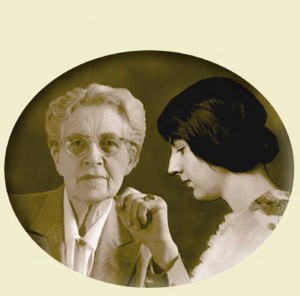
Lily Rabe & Jill Clayburgh
Written by Harry Clark
Music by Fauré, Debussy, Copland, Thomson, Stravinsky, Boulangers
2W: Nadia & Lili Boulanger
2M: pianist and singer OR pianist and cellist
3M: pianist, singer and cellist
“Every small town in America in the 1930s has two things: a five-and dime store and a Nadia Boulanger pupil.” Virgil Thomson
“The greatest privilege of teaching consists in getting the students to really look at what they think, to say what they really want to say, and to understand clearly what they hear.” Nadia Boulanger
Early on, I had the great fortune to work with Jill Clayburgh. She was generous of her time and I learned much from her. We became friends and she invited me to her house. During one visit her daughter, Lily Rabe, a junior in high school, bounded through the house. “Lili likes to act,” Jill offered up, and with this Lili disappeared outdoors. This got me thinking and it wasn’t long before I created Après un Rêve for them.

Nadia & Lili Boulanger
Nadia Boulanger was the music pedagogue of the 20th century. She taught for nearly 80 years, until her death in 1979. Composers as varied as Copland, Quincy Jones, Philip Glass, Elliot Carter, Astor Piazzolla and hundreds of others famous and not-so-famous studied with her; nearly all claimed she was the defining presence in their artistic development. She was a genius: Her genius was for teaching. This genius we greatly underestimate.
Nadia’s other obsession was her younger sister, Lili. Lili, sick from birth; Lili, the sister who had the goods to become the first great woman composer. Lili died in 1918, barely 25 years of age. For Nadia’s remaining 60 years her obsessions were two: teaching, and ensuring the world take notice of her sister’s genius.
It’s August 23, 1943—what would have been Lili’s 50th birthday. On this auspicious day, Nadia has just finished performing organ works of Aaron Copland and Lili Boulanger with the Boston Symphony, raising monies for the French Relief Agency during the height of World War II. After the concert Lili materializes, and in parallel remembrances the sisters recollect their lives together. But Lili must return to the dead with Nadia asking, “Lili, what do you hear at the other end? Is it one music, with no beginning, no end?”
